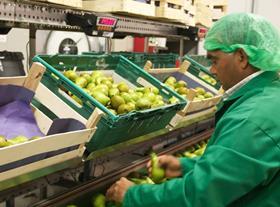
In Belgium, Carrefour will this week offer what it describes as the first residue-free pears, produced by six producers belonging to growers’ association New Green and cooperative BelOrta.
Together the growers boast 50ha of pear orchards, mainly in the Borgloon region, but also in West Flanders, Flemish Brabant and Wallonia.
According to VLAM, Flanders’ Agricultural Marketing Board, the fruit is grown using only biological inputs, auxiliary insects, biological pest management and organic farming techniques.
'Sixty per cent of the insects in the plantations are useful for pears,' said Jos Derwael of New Green. 'So we offer earwigs a place to nest in the plantation since they eat aphids, while kestrels also get a spot in the plantation, because they catch the field mice that eat the roots of the fruit trees. Meanwhile, fruit moths are confused by pheromone traps in the trees.'
From October, two low-residue apples are also expected on Carrefour shelves in Belgium, with 40ha of Novajo (a mutant of Jonagold) and Sweet Surprise (a cross between Gala and Braeburn) planted by New Green and BelOrta. Residue-free apples are anticipated within three years, according to VLAM.
Carrefour stated that undersized and less attractive fruit would be squeezed into juice and also sold at the retailer’s stores.
'Consumers are becoming increasingly interested in what they are eating,' said Carrefour’s Baptiste van Outryve, who revealed that both products would be sold under Carrefour’s Quality Chain label.



